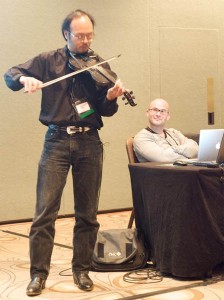From MySQL Cluster 7.0, it’s possible to use Cluster as the Data Store for the OpenLDAP Directory Server – this has 2 very signifficant implications:
- All of the advantages of MySQL Cluster (scalability, high availability and cost) can now be applied to your directory server deployment
- The same data held in a MySQL Cluster database can now be accessed simultaneously using LDAP in addition to SQL, the native C++ interface and all of the connectors available for MySQL
Howard Chu (Chief Architect of the OpenLDAP project and CTO of Symas) will be presenting a Webinar on Wednesday together with Mat Keep from MySQL. I’ll be helping with the Q&A.
Webinar details…
Wednesday, June 24, 2009
Discover how to fully exploit distributed subscriber and network data, and how to enhance your investments in OpenLDAP technology by tuning into this webinar, jointly run by OpenLDAP and MySQL.
In this webinar, the Chief Architect of OpenLDAP will demonstrate where this solution can be used, and how to get started with MySQL Cluster as the directory data store.
MySQL Cluster has been widely deployed for subscriber databases within Communications Service Provider networks. Extending this capability, MySQL Cluster Carrier Grade Edition 7.0 can be deployed as the back-end data store for LDAP directory servers.
Using industry standard LDAP directories with MySQL Cluster serving as the directory data store, operators can leverage standard LDAP interfaces to consolidate data stores, and for the authentication and authorization of devices and subscribers with real-time performance and carrier-grade availability requirements. The result is total solution that reduces cost, risk and complexity for large, transaction-intensive directory data sets.
WHEN:
Wednesday, June 24, 2009: 10:00 Pacific time (America)
Wed, Jun 24: 07:00 Hawaii time
Wed, Jun 24: 11:00 Mountain time (America)
Wed, Jun 24: 12:00 Central time (America)
Wed, Jun 24: 13:00 Eastern time (America)
Wed, Jun 24: 17:00 UTC
Wed, Jun 24: 18:00 Western European time
Wed, Jun 24: 19:00 Central European time
Wed, Jun 24: 20:00 Eastern European time
The presentation will be approximately 45 minutes long followed by Q&A.

